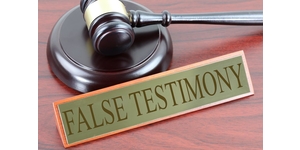
A recent Texas advisory ethics opinion addressed whether “a lawyer [has] a duty … to correct false statements made by his client in response to questioning by the opposing party’s counsel during a deposition.” See Texas Ethics Committee Opinion 692 (Oct. 2021).
Texas Opinion 692
Answering the question in the negative, the committee opined that when the “the [client’s] lawyer has not knowingly made any false statement of fact or law—only the client has lied,” a lawyer does not have an obligation to correct the false statements made by his client in response to questioning by the opposing party’s counsel during a deposition. Id. at 2. The committee noted, however, that the lawyer may not offer or use the false deposition testimony as evidence at a summary judgment hearing, during trial, or at any other time. Id. at 2-3. Finally, the committee opined that the lawyer’s silence in the face of cross-examination perjury did not amount to assisting his client in a criminal or fraudulent act in violation of the Rules of Professional Conduct. Id. at 3; See Texas Rule 3.03(a)(2).
Louisiana’s Approach
Unlike the Texas rules, a Louisiana lawyer’s mere silence in the face of a client’s material false statements in a deposition should violate the Louisiana Rules of Professional Conduct. Louisiana Rules of Professional Conduct rule 3.3(a) differs significantly from its Texas counterpart. Unlike the Texas rules, Louisiana Rule 3.3(a)(3) provides that “If a lawyer, the lawyer’s client, or a witness called by the lawyer, has offered material evidence and the lawyer comes to know of its falsity, the lawyer shall take reasonable remedial measures including, if necessary, disclosure to the tribunal.” See La. Rules of Prof’l Conduct, r. 3.3(a)(3) (emphasis added). Under the Louisiana rules, even if opposing counsel elicited the client’s false testimony, the lawyer has an obligation to take reasonable remedial measures–including disclosure of the falsehood–when the client testifies falsely at a deposition.
What remedial measures are “reasonable” in any given case turns on the circumstances. Clearly the lawyer must attempt to convince the client or other person who has offered the false testimony or document to correct the error. See ABA Model Rules of Prof’l Conduct R. 3.3 cmts. 5-11. In addition, the lawyer may consider withdrawing from the representation. Id. cmt. 10. However, withdrawal alone typically will not satisfy the lawyer’s obligations under this rule, unless the withdrawal is “noisy”–that is, unless the lawyer discloses the false evidence to the tribunal at the time of withdrawal. Id. Finally, although some lawyers believe that they can comply with this rule through permitting their client (or other witness) to testify falsely in narrative form (that is, without questioning by the lawyer), the ABA has soundly rejected that approach. See ABA Comm. on Ethics and Prof’l Responsibility, Formal Op. 87-353 (1987); ABA Stds. Relating to the Admin. of Crim. Justice–The Def. Function std. 4–7.5(a).
Although perhaps obvious, this rule applies in the context of civil pretrial discovery. See In re Marshall, 753 So. 2d 166, 167-68 (La. 2000) (disbarring lawyer for, among other things, advising clients to testify falsely in depositions). Therefore, this rule requires a lawyer to take reasonable “remedial measures” to correct the record when the lawyer learns that a client or another witness has testified falsely during a civil deposition or has otherwise furnished untruthful discovery responses. See, e.g., Jones v. Clinton, 36 F. Supp. 2d 1118, 1130 n.15 (E.D. Ark. 1999); Herman v. Zatzkis, 632 So. 2d 302, 304-05 (La. Ct. App. 4th Cir. 1993) (finding that lawyer failed to reveal false nature of backdated document offered into evidence); see also La. State Bar Ass’n v. White, 539 So. 2d 1216, 1219 (La. 1989). The lawyer may not simply withdraw from further representation in the matter. See, e.g., ABA Comm. on Ethics and Professional Responsibility, Formal Op. 93-376 (1993).
